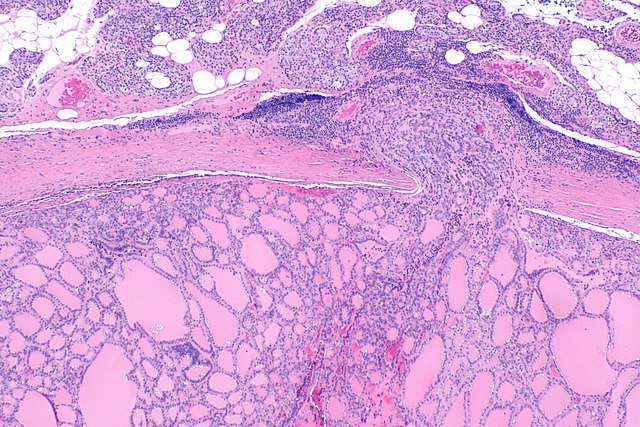Thyroid Cancer
Thyroid cancer occurs when abnormal cells in the thyroid gland grow uncontrollably. Although it is relatively rare, thyroid cancer is one of the most treatable types of cancer, especially when detected early. Symptoms may include a lump in the neck, difficulty swallowing, and changes in voice. Mr. Hariri is a thyroid cancer expert and provides a comprehensive diagnostic and treatment services to ensure the best outcomes for all his patients.

About thyroid cancer
What is Thyroid Cancer?
Thyroid cancer develops when cells in the thyroid gland mutate and begin to grow uncontrollably. There are several types of thyroid cancer, including papillary, follicular, medullary, and anaplastic thyroid cancer, with papillary being the most common and least aggressive form.
01. What Causes Thyroid Cancer?
The exact cause of thyroid cancer is not always clear, but several risk factors can increase the likelihood of developing the disease:
Genetic Factors: A family history of thyroid cancer or genetic conditions like familial medullary thyroid cancer.
Radiation Exposure: Previous exposure to high levels of radiation, particularly in childhood.
Age and Gender: Thyroid cancer is more common in women and typically occurs in individuals over the age of 30.
02. What are the Symptoms of Thyroid Cancer?
Common symptoms of thyroid cancer include:
A lump or swelling in the neck
Difficulty swallowing or breathing
Hoarseness or changes in the voice
Persistent cough not related to a cold
03. What Causes Thyroid Nodules?
How is Thyroid Cancer Diagnosed?
The diagnosis of thyroid cancer involves several steps:
Physical Examination: A thorough neck examination to detect lumps or abnormalities.
Blood Tests: To check thyroid function and measure levels of thyroid-stimulating hormone (TSH) and other markers.
Ultrasound Imaging: High-frequency sound waves create detailed images of the thyroid gland, helping to identify suspicious nodules.
Fine-Needle Aspiration Biopsy (FNAB): A thin needle is used to extract a sample of cells from the thyroid nodule for microscopic examination to check for cancerous cells.
Radionuclide Scan: Sometimes used to assess the activity of thyroid nodules.
04. What are the Treatment Options for Thyroid Cancer?
Treatment for thyroid cancer depends on the type and stage of cancer, as well as the patient’s overall health:
Surgery: The most common treatment, involving the removal of part or all of the thyroid gland (thyroidectomy).
Radioactive Iodine Therapy: Used to destroy any remaining thyroid tissue or cancer cells after surgery.
Hormone Therapy: To replace thyroid hormones and suppress TSH levels, which can help prevent cancer recurrence.
External Beam Radiation Therapy: Occasionally used for more advanced thyroid cancers.
Targeted Therapy and Chemotherapy: Used in specific cases, particularly for more aggressive types of thyroid cancer.
Free download resources
We have brought together some useful leaflets from other sources for more information. By clicking on Download button, you have confirmed to agree with our terms & conditions, privacy policy, and end-user agreement. We keep updating this database to help our users however provide no assurances as to the accuracy of validity of the information.





